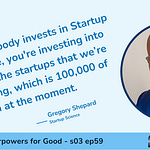Devin: What do you think of as your superpower?
Avi: I can’t stop. There’s no way.
When I visited the Beit Dror LGBTQ youth shelter in Tel Aviv last month, it took me a while to appreciate that the most significant risk the kids faced was not emotional stress but actual threats to their lives. In some Arab-Israeli communities, honor killings are still an issue.
During our visit, Avi Soffer, the operations manager of the shelter who officially has been given a title that translates literally as “mother of the house,” shared stories I knew I couldn’t tell without his help. I invited him to record an episode of the show, which we did shortly after my return. I’m excited to share that with you.
AI Summary
Like most people who produce content for a living, I’m experimenting with AI tools. I used one to generate this summary of the interview:
Avi Soffer is the operations manager at Beit Dror, the only shelter in Israel that deals with minors ages 14 to 18 who are part of the LGBTQ+ community. Beit Dror's population has changed over the years, with more trans people seeking shelter. There is also a range of ethnic and religious backgrounds, including ultra-Orthodox Jews (Haredi), and Arab youth. The youth at the shelter face the threat of honor killing or being disowned by their families, with some incidents of family members attacking the youth. The shelter has a family therapy program that helps bring family members back together, with over 35% of youth returning to their homes. Avi talks about the struggles that marginalized youth face when coming out to their families, and the violence or shunning they may experience. The center provides counseling and life skills training, such as taking care of their bodies and asking for help. One of the biggest challenges is getting parents to accept their LGBTQ children, but Avi is hopeful that attitudes can change. He emphasizes the importance of taking small steps, not seeking external validation and being creative in finding solutions to problems. Anyone interested in his work can reach out to him directly.
Saving Lives at Beit Dror
“Beit Dror: The meaning of the name is a house of freedom or home of freedom,” says Avi. “It’s an LGBTQ youth shelter, the only one in the country for minors.”
Avi has been an activist in the gay community since he came out. “I was married. I had two children married to a woman. And I came out at the late 80s.”
He notes that there have been remarkable changes in the population served at the shelter over its twenty-year life. Initially, the kids identified as gay and came as they approached 18 years old. Today, most of those served in the shelter are trans and arrive much younger, some not yet 13 years old.
The youth most often come from communities outside the large, secular Jewish population. They come from the Haredi ultra-orthodox Jewish, Arab Muslim, Arab Christian, Palestinian and Bedouin communities. In these more religious communities, the disconnect between a family and a trans youth may be too significant for the child to overcome without outside help.
Avi shared the story of an extreme example. “We had a kid from a village in the north. She came out as a trans. She was 15.”
“One Friday, her brothers came,” he says. “They planned it because they had to drive 2.5 hours. They waited outside, and they stabbed her.”
“They stabbed her badly. She was saved by one minute, Avi says.” It’s a miracle.”
Avi and the team also hope to do the best for the child. Often, this is to help facilitate a safe and happy return to the family, working with social workers. More than 35 percent of the time, this works.
“The thing is,” Avi says, “to show them that we are not the devils they think we are.”
Over the years, Avi has learned to celebrate small victories. “You have to believe in the small changes that you make. What happens is that sometimes they come back after two years, five years, ten years, and they say, ‘Wow! It saved my life!’”
Avi has had a few birthdays. I didn’t pin him down, but he’s been at this for a while. He just can’t quit. That, he says, is his superpower.
How to Develop an ‘I Can’t Quit’ Attitude As a Superpower
To help us understand his superpower, Avi shared his story:
At first, I was not an activist. I was a so-called straight person. I had a nice career. I'm a designer by profession. I was a jewelry designer. I had an amazing career. I had a wife I met at 14; at 20, we got married. We have two wonderful children. Everything was fine.
I didn't even know what—the first time I heard the word gay, I was a father. Back then, there was no word. There was no word. I went to all the therapies. I even went into conversion therapy without even knowing. I didn't know that at that time. Because somebody said, “That's not a problem; we can do this and this and this and we'll solve it. Okay, fine.”
It was the 80s; it was so backward. There was no television here. There was no—I didn't—I can't even find the words, as you see, to describe it. Because how would you make a thought without words? I didn't have the words.
Then I went to hell. It took me eight years. Then I decided. Okay, I can't leave like this. It's impossible. It took me years to say, “Okay, that's what it is. You're gay. It's simply this. You're homosexual, and that's it.”
I was with my wife. We had an amazing relationship. We loved each other. We still do. It has nothing to do with it. But it was very difficult, first, to explain it to myself and then to explain it to the world—that it's even possible with two children back then.
A rabbi turned me into an activist. Divorce court. Rabbinates Chief Justice, this stranger. You're ready to laugh your head off. Okay. I went through a horrible divorce. Horrible. Horrible. A lot of things that happened then that cannot happen today.
In one of the stages, we reach the discussion of custody. Because I'm a married kind, five months after we separated, I already had a boyfriend. We lived together for 15 Years. And we are business partners, and we are like brothers ever since.
So we. There was a court regarding, “Okay, he's a homo. What about the kids?” In Israel, it's religious weddings, marriages. I was charged in rabbinic court.
Then there was the recess. The chief justice, a rabbi with a beard down to the floor, leaned to the other and says, in Yiddish. (I am from a Sephardic family.) He leans to the other and says, “Well, if he's this, then he can’t see the kids at all. What is the question?”
Only he didn't count on the fact that I will be the only person that heard it and the only one who understood Yiddish.
I went out from court, and I said, “I don't care about anything. Nobody is going to disconnect me from my children.” I became an activist within a week.
I had no idea about it. I said, “No, no, no. They're going through it. They will succeed.” Then I went to the only organization that was in the country. A few months later, I was on the board. A few, two years, later, I was a chairperson.
It's in my blood. I can't see myself without it. I always feel I'm always on the front. I'll always take the worst cases because I feel somebody needs to do it. I cannot sit at home. It's not possible. If there's one kid. I'll be there.
This intensely personal story explains how Avi became an activist who can’t quit. Most of us won’t go through an experience that will light a similar unquenchable fire, so I asked him for some coaching tips for developing a can’t-quit attitude.
He offered three suggestions:
First, he reinforced the message he shared earlier about the importance of celebrating small wins. Big progress takes time, but the work happens every day. You’ve got to see and celebrate the little things.
Second, he notes that those little wins may sometimes be big. A young person who spends a week in the shelter and then disappears may return in 20 years, saying, “You saved my life.”
Finally, he says, you need to develop resilience to opposition. He explained in this vivid metaphor:
Let's say, somebody in the community wants to put a knife in my back. I deal also with politics. It can happen. It's very problematic. My back is full of knives. There's no room to put another one. You have to take one out. And that's it. If you sit and wait for everybody to love you and appreciate what you do, you're bound to fail. It's not going to happen.
By following Avi’s example and coaching, you can make a can’t-quit attitude a superpower enabling you to do more good in the world.
















